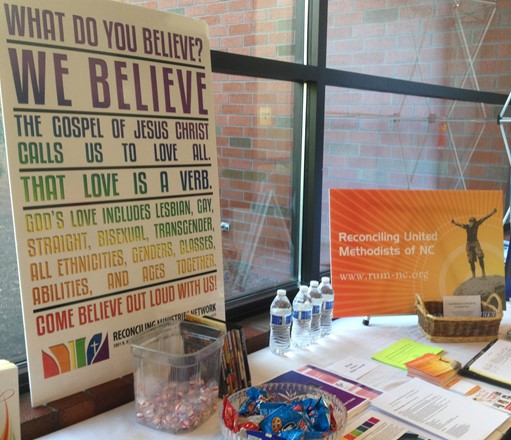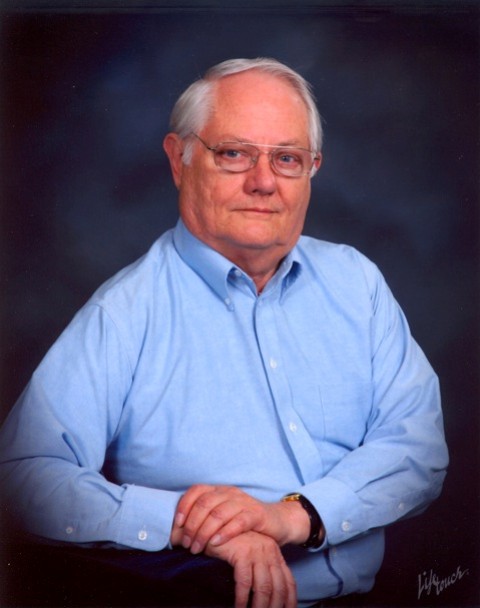
As I See It
A series of columns written from 2007 – 2011 about being gay and Christian written for the RUM-NC newsletter
by John Suddath

My name is John Suddath. I am a member of Edenton St. UMC, a Methodist for 58 years, and a preacher’s kid. My father was a Methodist minister for 45 years. I have been a member of RUM-NC for about 4 years. I also am involved in a number of other volunteer programs, and thus RUM-NC is only one of my priorities.
RUM-NC will be celebrating its 10th year this summer at the NC Annual Conference. We have increased our visibility each year adding an exhibit table, informational materials, a display of “silent witnesses” outside the exhibit hall, and an inclusive worship service and free piazza lunch. In addition to annual conferences, several members attended the 2000 and 2004 General Conferences and the 2004 Southeast Jurisdictional Conference. Several of our members have attended the Reconciling Ministries Network National Convocations, and we had a large representation at the September 2005 Convocation at Lake Junaluska. Two of our members have served on the national board of the Reconciling Ministries Network.

It’s time for the Methodist Church to come out of it reliance upon a 19th Century Cultural Bias.
The same biblical proof text arguments that are used to condemn homosexuals follow the same self-righteous justification that was used in the pulpits in the 1800’s to justify slavery. Too much of the stance of the church has been the result of politically maneuvering and not careful examination of beliefs and faith. The discussion so far has shed more heat than light, and the emotional hysteria involving anything to do with sex is archaic Puritanism.
It’s time to acknowledge that while many people have long-held sincere beliefs that homosexuality is a sin, there is no clear biblical justification for such a view. It has more to do with the “way we were brought up” than in biblical exegesis.
It’s time for the Methodist Church to come out of a policy that excludes an entire class of people from full membership in the church. Let’s quit arguing about whether or not to endorse homosexuality and homosexual relationships and start focusing on how to reach millions of people who have no church or have left the church for good reason.

We’ve been encouraged to provide more original content for the listserve, so I’ve agreed to provide a regular monthly column titled, “As I See It.” Although the suggestion may be withdrawn after this piece, I’ll say what I have to say with my usual bluntness and let the chips fall where they may.
From my occasional posts on this site, you might infer that I’m a LGBT activist, but the truth is that that issue ranks third in my priorities behind universal health care and long-term care enhancement --- and I’m involved up to my eyeballs in both issues. So those aren’t so controversial and don’t grab as much press --- don’t they sound pretty Methodist to you?
As a PK, I understand that you have to politick with the DS and the bishop, but I also understand that the Kingdom never was advanced by promoting self-interest. As I said in “my story” distributed at annual conference, I think for too long we’ve focused on the wrong issue. We’re not asking for an endorsement of the “homosexual lifestyle.” Frankly, I don’t care what you think (or the Methodist Church for that matter) of what I do or don’t do in bed. Wouldn’t you resent it if someone asked you how many times you and your wife had sex? It’s none of your business.
We’ve been warned about the perils of generalizations --- so how do we get a handle on understanding the LGBT community in the Carolinas? First, a little history: For 25 years (before the World Wide Web), the primary means of communications was a LGBT newspaper published in Raleigh called THE FRONT PAGE that was distributed in the bars (the primary social center) and supported by their advertising. It was followed by a competitor published in Charlotte called Q-NOTES that took the lead when THE FRONT PAGE ceased publication in 2006. THE FRONT PAGE survived by being co-housed with the Raleigh LGBT bookstore The White Rabbit that also had stores in Wilmington and Charlotte.
Although the major cities have sizable LGBT populations, most people would be surprised to learn that towns such as Wilmington, Hickory and Hendersonville also have a lot of queers hidden in the woodwork. Greensboro, Raleigh, and Charlotte, as the largest metropolitan areas, had professional organizations sometimes called the gay chamber of commerce. The Triangle Business & Professional Guild survived for 10 years before folding in 2006. At its peak, the Guild had 400 members, an average monthly attendance at the RTP Holiday Inn of 125 and built a Habitat for Humanity house in Durham. The organizations in the other cities are thriving. A LGBT web site called GayTriangle.com appeared for about six months in 2000 to be followed by OutTriangle.Com in 2005 that still maintains a calendar. The national web sites/magazines The Advocate and Planet Out have large participation in the Carolinas. In 2004 the Raleigh Convention & Visitors Bureau hired a staff member to promote LGBT business. New York, San Francisco, DC, and LA get most of the media attention as LGBT centers, but cities such as Palm Springs, Philadelphia, and Miami also are courting gay tourism and business.